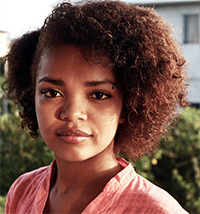OVER the past two years, I have been feeling a more authentic version of myself. This feeling is partly because of, but certainly not limited to, the freedom I feel now that I have embraced my natural hair texture.
There was a time in the past when I would have scoffed at the idea of natural hair being respectable, and look on my unruly curls with trepidation. At the time, I strongly believed that the decision  to want straight, long locks was mine, and the question as to why I felt this way never occurred to me, because we were never taught to ask; we were just supposed to follow. And for years I invested in European standards of beauty, seeing investment in my own hair as something akin to hilarious.
to want straight, long locks was mine, and the question as to why I felt this way never occurred to me, because we were never taught to ask; we were just supposed to follow. And for years I invested in European standards of beauty, seeing investment in my own hair as something akin to hilarious.
While I do know that there are women who merely relax or cover their hair because of convenience and manageability, their numbers are small in comparison to those who merely do it because they don’t see their own hair as good enough. And I was one of the latter.
I have since come a long way in the way I feel about my hair; but I know that the majority of people are still trapped in their illusion of “choice”, and what is considered “respectable” or “professional” hair.
CASE IN POINT
That’s why, when something Online caught my attention recently, I was not very surprised. After all, black people and their hair has long been “knotted and gnarled by issues of race, politics, history and pride.”
A young man working at an insurance company in Trinidad & Tobago was last week issued a warning by management that if he continued coming to work with his “unprofessional” hairstyle, he could be faced with unemployment. Unsurprisingly, the man who was sent the letter was of African descent, and while his hair was neatly twisted and of similar length with several male employees who have straight hair, he was the one who was singled out because his hair did not readily conform to what the managers considered to be respectable.
There were some arguments that, based on the young man’s ethnicity and ‘nappy’ hair, he should keep it low; while other employees, more able to fit into euro-centric ideals, were allowed hair longer or of the same length. While I know that such beliefs exist — even here in Guyana, as I myself can attest, thanks to an over-exuberant senior Kaieteur News reporter — I still find it a little hard to believe that ethnic differences are used as a seemingly valid reason to single out an employee. Black people’s hair, unfortunately, can often have implications beyond the aesthetic level, as beauty standards continue to be defined and reinforced by a dominant culture.
DE RIGUEUR
Men are expected to have close-cut trims, while women are expected to cover or straighten their hair; and any deviation from that is fiercely frowned upon and beaten into submission.
What we have now — in not only Trinidad, Guyana and other Caribbean countries, but around the world — is a system which continues to perpetuate discrimination through things such as HR policies and middle-class respectabilities, merely because we are a people still hindered by our colonial history and mentality.
While we can continue to appease the masses, there must come a time when we embrace ourselves for who we are, and be proud of the strength we symbolise. While I know that not everyone who wears natural hair is trying to make a political statement, I love the fact that more and more persons are choosing to wear their hair in its natural state, despite what their reasons might be.



.jpg)







